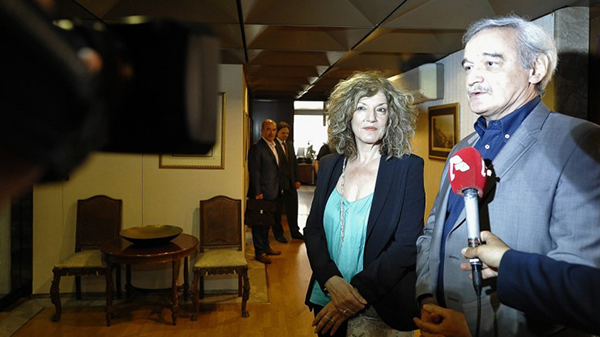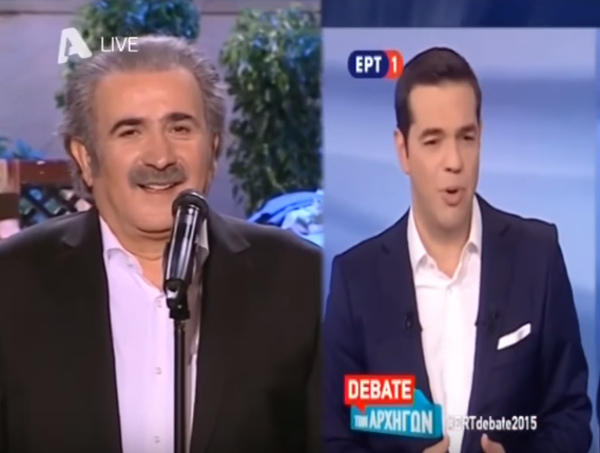Qatari officials reacted with outrage. Prime Minister Sheik Mohammed bin Abdulrahman al-Thani demanded retaliation “from the whole region” against Israel.
Shock compounded his rage.
Qatari officials long pursued policies that coddled terrorists and promoted extremism, but they believed themselves immune because of three strategies Doha pursued to escape accountability: granting the US a multibillion-dollar air base at Al Udeid; positioning Qatar as a mediator with unique access to some of the world’s worst terrorists and militants; and outright bribery.
Abutting a huge offshore gas field provides Qatar’s approximately 300,000 citizens tremendous wealth. Qatar’s per capita income is the seventh highest in the world, almost twice that of Australia, yet every Qatari citizen could fit in Wollongong.
The emirate’s tremendous social security network means Qataris in practice do not need to work; migrant workers do much of the country’s heavy lifting.
The Prime Minister is likely upset for another reason; while Qatari spends billions of dollars on American weaponry, its US-provided air defence never fired. One Qatari official told me angrily that US warning of the Israeli attack came only after the first bombs had dropped in Doha. Qatari officials welcomed President Donald Trump’s statement condemning the Israeli attack but it was hardly worth the $604m plane the Qataris gave to the President.
Israel is as livid.
On October 7, 2023, a video showed Hamas leaders in the Doha villa Israel bombed celebrating the slaughter of Jews.
Journalists working for the Qatar-based Al Jazeera network not only covered the Hamas slaughter of Jews, they also participated in it.
Qatar argues its mediation with Hamas is altruistic, but Israelis beg to differ.
Whether between the US and the Taliban or Israel and Hamas, Qatar arbitrates but wants the Islamists to win.
Qatar mediates not because it seeks peace but because it has unique links to some of the world’s worst Islamist groups.
To understand Doha’s role as intermediary, picture police using an informant to pass messages to a drug gang. The informant remains a criminal, albeit one who uses his own connections to buy temporary immunity. Qatar’s role is more pernicious.
From the Taliban to Hamas to violent Muslim Brotherhood offshoots to Somalia’s Al-Shabab, Qatar allows the groups it hosts to access the global financial system and launder money.
The crises Qatar sparked with moderate Arab states in 2017 were rooted in Doha’s support and supply for Islamist and terror groups seeking to destabilise the region.
Many Western states, including Australia, condemned Israel.
“The Australian government believes this was the wrong thing to do,” Foreign Minister Penny Wong said.
Moral clarity matters
“Qatar, as you know, has been one of the parties seeking an immediate ceasefire.”
Such a statement is naive, akin to praising the firefighter who happens to moonlight as an arsonist.
Qatar has long been part of this war on the West, even as it tries to escape accountability for its actions. Moral clarity matters.
Qatar funded a terrorist group that, during a ceasefire, not only invaded Israel but also targeted some its most liberal, pro-peace and progressive communities. It seized hostages that it still holds.
There really should not be diplomatic complexity.
Hamas took power in Gaza through a coup against its coalition partner.
It started a war. It holds hostages in contravention of international law.
If Wong wanted to bring peace, she would take a no-nonsense approach: The only messages Qatar should pass to Hamas is first to release all hostages without precondition or concession and, second, disarm and disband or die. Anything else rewards terror.
What undercuts Wong’s approach and that of other Western diplomats is lack of historical awareness.
Many foreign ministers serve no more than five years. In the past 50 years, only Bill Hayden, Gareth Evans and Alexander Downer have served longer. The last US secretary of state to serve more than five years was George Shultz, who served president Ronald Reagan for seven years.
For officials such as Wong, whose previous experience was outside the diplomatic realm, this means they enter office with only limited understanding of history.
It can be tempting in such circumstances to see groups such as Hamas or regimes such as Iran’s Islamic Republic as facts of life and grow frustrated with countries such as Israel that refuse to accept reality. But it is this notion of permanence that is wrong.
Had Australia accepted the Khmer Rouge as eternal because of its territorial control and ideological monopoly, millions more might have died in Southeast Asia.
Not only is Hamas a historical anomaly, so too is Qatar’s embrace and financing of Islamist causes.
The goal for Wong and her Western and moderate Arab counterparts should be less bashing of Israel and more rolling back Qatar’s support of the world’s most odious Islamist movements.
During my first visit to the country in 1994, Doha was a dusty outpost. It had a corniche, and a few hotels, but there was little for Qataris or the few foreigners who worked for oil companies or served at foreign embassies to do.
Qatar’s emir
As one of only two countries that made Wahhabi Islam its official religion, the country shut down during the Muslim weekend. Doha International Airport was barebones, smaller and less fancy than any provincial Australian airport. Qatar was conservative, but its influence on the global stage was minimal.
As an absolute monarchy, Qatar’s emir determines policy. He abides no debate or second-guessing.
Qatar has had only four emirs since its 1971 independence. Two were ousted by their successors and the third, the father of the current emir, resigned.
Sheik Ahmad bin Ali, who governed Qatar from 1960 through independence until his cousin Sheik Khalifa bin Hamad overthrew him, created a civil service and supported the oil and gas exploration whose success ultimately made Qatar rich.
Sheik Khalifa modernised the state but asserted strict control over energy industry and commerce. Outside energy companies, outside investors, stood clear. In 1995, his son Hamad bin Khalifa deposed him while Sheik Khalifa was vacationing in Switzerland.
Hamad, too, would serve an abbreviated term. In 2013, suffering poor health, he resigned in favour of his son Tamim.
Hamad forever transformed Qatar in two ways. Most Westerners know Hamad as the emir who passed investment laws that sparked Qatar’s rapid development. As important, however, was his ideological legacy.
Qatar has always suffered from a lack of self-confidence.
Borders within the Middle East may be arbitrary remnants of a previous diplomatic era and military engagements, but most states are legitimate: Egypt traces its history back millennia. Israel is the traditional homeland of the Jewish people whose return represents perhaps the most successful decolonisation effort ever. Iraq traces itself to the Babylonians and Syria to the Syrians. Even Bahrain has an ancient civilisation – Dilmun – that it can call its own.
Qatar, however, is completely artificial in every way, an entity formed when, in the mid-19th century,
Wahhabi forces successfully rebelled against their Bahraini governors. Saudi Arabia, the only other Wahhabi state and a country as artificial, nevertheless gains legitimacy both as custodian to the holy mosques in Mecca and Medina and as the birthplace to sect founder Muhammad ibn Abd al-Wahhab (1703-92).
By promoting Islamism and patronising extremist movements worldwide, Hamad hoped to create a legitimacy rooted in piety that Qatar could juxtapose against its decadent neighbours, even as Qatar’s oil and gas wealth allowed its leaders and public to live in luxury.
A major mechanism with which to achieve this second goal was the multibillion-dollar Qatar Foundation, a charity Hamad founded with his second wife Moza bint Nasser Al-Missned, mother of Tamim. Sheika Moza, an unrepentant Islamist, remains perhaps the greatest influence on Sheik Tamim.
What Moza and Tamim have achieved is nothing short of state capture: Qatari largesse corrupts universities, politicians, charities, and media. While recipients say the money comes without strings attached, this does not pass the smell test. After all, if the gift of a free plane to Trump constitutes a malign attempt at influence, why would donations more than a magnitude higher not represent influence?
Many young Qataris may be conservative but they do not necessarily agree with Qatar’s support for extremist and terror groups. They understand that Qatar is not immune to history or the forces it unleashes.
Ultimately, every regime that has sponsored jihadism for export has suffered only Islamist blowback. Pakistan was once largely secular, with Hindu and Christian festivals counted as national holidays, but it is now a hotbed for radicalism and terror.
Syrian president Bashar al-Assad profited from the underground railroad of al-Qa’ida-linked suicide bombers into Iraq, only to have the same groups turn on him. Saudi Arabia stopped its support for radical Islamists not after the September 11, 2001, attacks on New York and Washington but when al-Qaeda turned its sights on Riyadh itself with a series of compound bombings and assassination attempts.
Turkey, too, became a target for Islamic State despite the largesse it received from President Recep Tayyip Erdogan. The same will be true with Qatar.
Nor should Qatar expect the victims of terrorists it supports to differentiate between terror financier and proxy group. The danger for Doha now is that the Rubicon is crossed. The first attack makes international headlines; as Lebanese, Libyans, Iraqis, Syrians and Yemenis can attest, further attacks eventually barely merit back page treatment. Meanwhile, the investment climate Qatar has spent decades building will collapse alongside Qatar’s ambition to host the 2036 Olympics.
If Wong truly cares about peace, she would tell Qatari leaders they have a choice: Sheika Moza and Sheik Tamim can cut off terror, or Doha will become Damascus rather than Dubai. Australia and other countries have leverage: Qatar certainly qualifies for the grey or black list placement by the Financial Action Task Force, the international body policing money laundering and terror finance. By any objective measure, Qatar also crosses a threshold that qualifies it for designation as a state sponsor of terror.
Unilateral if not international sanctions are arrows in the policy quiver, all to influence the decision that will define Sheik Tamim’s legacy: Will he prioritise mother over motherland, or condemn Qatar to rogue nation status and destruction?
https://www.aei.org/op-eds/the-problem-with-doha-why-israels-hamas-attacks-outraged-qatar/






















